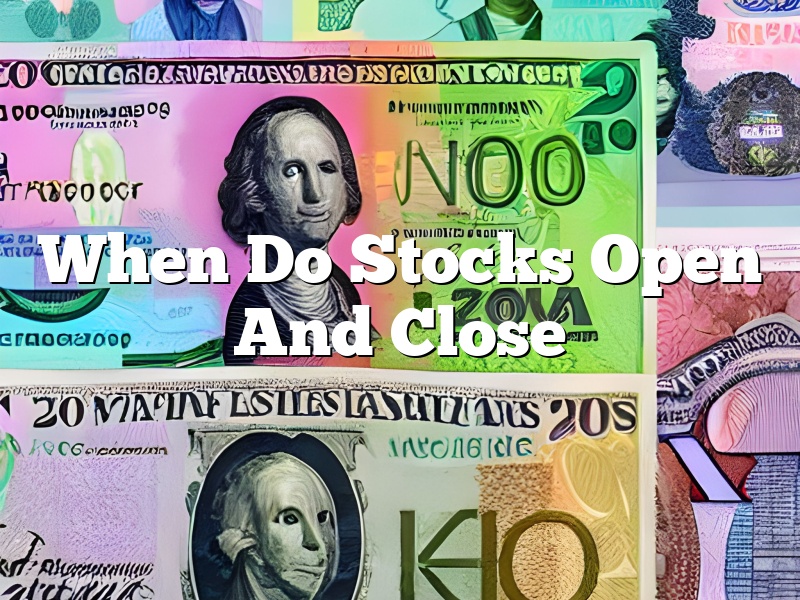When Do Stocks Open And Close
When do stocks open and close?
This question is not as straightforward as it seems. The answer depends on the stock exchange.
On the New York Stock Exchange (NYSE), stocks open at 9:30am ET and close at 4:00pm ET.
On the Nasdaq, stocks open at 9:30am ET and close at 5:00pm ET.
There are other stock exchanges around the world with different hours. For example, on the London Stock Exchange (LSE), stocks open at 8:00am GMT and close at 4:30pm GMT.
The best way to find the hours for your favorite stocks is to check the website of the stock exchange.
Contents
Can you still buy stock after-hours?
Yes, you can still buy stock afterhours.
Afterhours trading is the term used for buying and selling stocks outside of the regular trading hours on the stock exchanges. The regular trading hours are 9:30am to 4:00pm EST on weekdays.
The advantage of afterhours trading is that you can potentially get a better price for a stock. The disadvantage is that the liquidity of the stock may be lower, meaning there may be less people willing to buy or sell the stock.
Most brokers offer afterhours trading, but the availability and hours of afterhours trading vary from broker to broker.
What is the 3 day stock rule?
The three-day stock rule is a regulation that requires the SEC to publicly disclose information about a company that has been trading for less than three days. The rule is designed to ensure that investors have the same information about a company regardless of how long it has been trading.
The three-day stock rule is also known as the Rule 15c2-11, which is the section of the Securities Exchange Act of 1934 that established the rule. The rule was first implemented in 2000 and was updated in 2007.
What is the 10 am rule in stocks?
The 10 am rule is a stock market trading rule that suggests that stocks should not be sold or bought until 10 am. The rule is based on the idea that the morning market is driven by news, and that the market will have had a chance to digest the news by 10 am. After 10 am, the market is driven by traders and investors, who are making decisions based on technical analysis and fundamentals.
What days are the stock market closed in 2022?
The stock market is closed on the following days in 2022:
January 1 (New Year’s Day)
January 15 (Martin Luther King Jr. Day)
February 19 (President’s Day)
May 27 (Memorial Day)
July 4 (Independence Day)
September 2 (Labor Day)
November 11 (Veteran’s Day)
November 26 (Thanksgiving Day)
December 25 (Christmas Day)
How do you know if a stock will go up the next day?
There are a few key things to look for when trying to predict if a stock will go up or down the next day.
One of the most important factors is the company’s earnings report. If a company releases good news, such as strong earnings or a positive outlook, the stock is likely to go up. Conversely, if a company releases bad news, such as weak earnings or a negative outlook, the stock is likely to go down.
Another key factor to consider is the overall market trend. If the market is trending up, stocks are generally more likely to go up as well. Conversely, if the market is trending down, stocks are generally more likely to go down.
Finally, it’s important to look at the company’s fundamentals. If a company is financially healthy and has a good track record, it’s more likely to go up than if it is struggling financially or has a poor track record.
Why do stocks spike after hours?
Stocks can spike after hours for a number of reasons. Some investors may be buying or selling stocks after the market has closed in order to take advantage of price changes. Additionally, company news may be released after the market has closed, causing stocks to spike.
What is the 1% rule for day trading?
There is no one rule for day trading, but there are a few general principles that can help increase your chances of success. One of the most important is to only risk a small percentage of your account on any single trade. This is known as the 1% rule.
Another key principle is to always trade with a plan. This means having a specific strategy in place, and sticking to it. It’s also important to remain calm and disciplined, and not to let your emotions get the best of you.
There are other factors to consider as well, such as choosing the right time of day to trade, and finding a good stock to invest in. But following these basic principles can help you get started on the right foot.






0